#Escape from the Liberty Cinema
Explore tagged Tumblr posts
Text
On Luthor and Lily... Again
Since I was asked, here’s the 'stuff too big and unwieldy to place into the tags' of this post made separately because i want it to show up in the tags.
So, I very much had this image in the back of my mind while making the render:
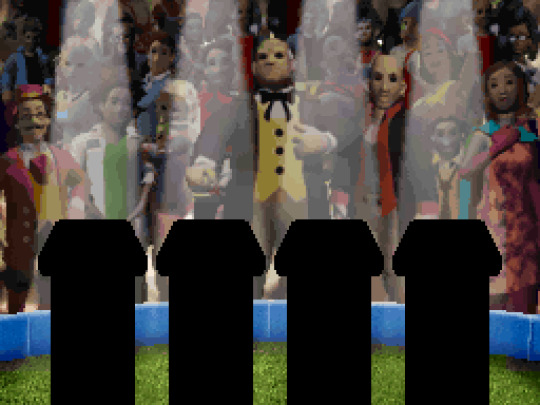
It’s one of the (three) backgrounds that the DS-exclusive Pet Show minigame can have (if you couldn’t tell from the dark, suspiciously phallic shadows where the podiums are supposed to be). This one, as seen, clearly portrays Daddy Bigbucks flanked by both Lily (on his right) and Luthor (on his left).
[Rest under the cut bc... this isn't short.]
Daddy is dead center in the image and physically taller than everyone else in the picture (maybe he’s in front of everyone; maybe he’s standing on something; maybe it’s artistic liberty; who knows. Daddy Bigbucks is otherwise not shown to be particularly tall in either The Urbz or The Sims Bustin’ Out.). Daddy is also tilted back and looking off to the side, as if everything here is beneath him (and yes—this is his standard pose, but it was still a decision to keep it!). His face is also perfectly framed between the spotlights as well.
And Luthor’s face is kinda framed too? He is behind Daddy, with Daddy’s elbow being in front of his shoulder. He’s not standing straight ahead; he’s tilted a little bit to his right as if Daddy’s elbow is making him do that. Although, he’s not really… doing anything else but standing.
On the other hand, Lily Gates looks to be almost squeezing through the crowd to get to the front. Her face isn’t very visible, and she’s tilted far to her right. She almost looks as if she’s trying to fit into the picture but nobody could be bothered to make room for her.
I think it's an interesting in-game display of how... self-centered Daddy is and how he pushes everyone else behind him.
In addition, I was also thinking about how Daddy probably presented himself in his film that premieres during the story, Tycoon Tycoon!: The Daddy Bigbucks Story. So, first off, I want to point out that, at certain hours, the cinema shows a film about Daddy Bigbucks.
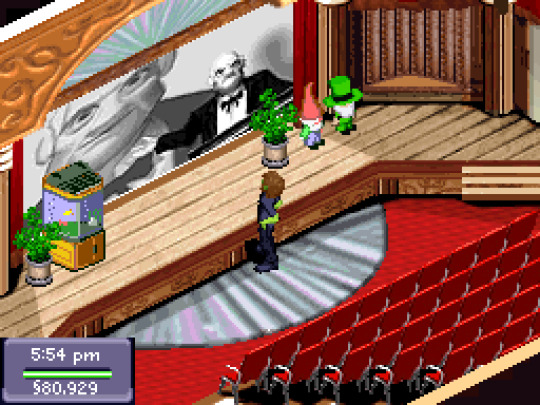
So, I'm not sure if this is meant to be Tycoon! Tycoon! nor if that film is his only movie about himself or if he has… others (I mean he's like 70; he's had plenty of time to make films about himself.). The game seems to be quite vague about it. When Theresa talks about Daddy's takeover of her cinema, she says that Daddy "just wants to show films about himself, over and over." Which only really implies that Daddy only wants to show films about himself and not that he already is doing so or that they exist.
(For brevity's sake, he says the following when asked about movies: "Movies? Films? I don't have time for such silly escapes. I do own two production companies, but that doesn't mean I care." Apparently, he only cares about movies when it's about him. And I mean he says the following about theater... "When I realized the play "As You Like It" had nothing to do with me or what I liked, I decided to stop going to theater all together.")
The fact that the movie is seen playing before completing mission 5-5 (at least I'm pretty sure it plays before then) points to it not being Tycoon Tycoon! but one of the frames displays Polly Nomial, implying that this film was taken recently... so? I think it's meant to be, but due to the static nature of the world, it just plays all the time. Whatever.
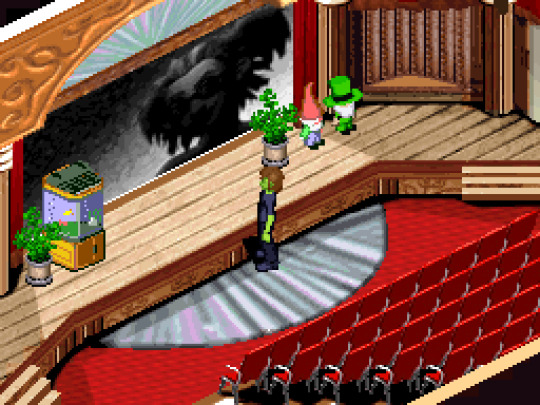
So, now HERE'S why this matters to this post. Luthor shows up in the Cinema Lobby twice a week (Wednesday from 5:00pm-7:59 pm & Friday from 9:00am-11:59am). (This screenshot is his original orientation & location.) And while Luthor is in the Cinema Lobby, the film featuring Daddy Bigbucks (the films playing in the cinema are defo scheduled by hour).
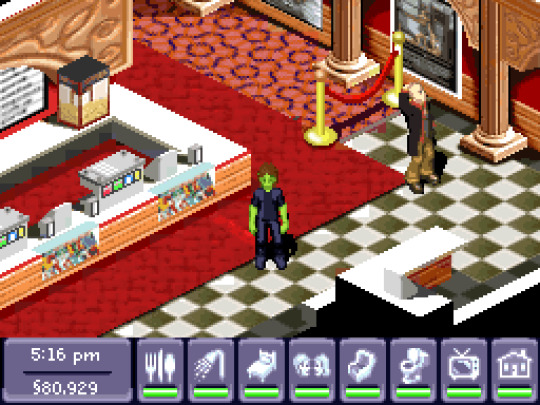
Luthor only ever visits the lobby. He never goes into the cinema, unlike Sims who do see movies (Kris Thistle & Pritchard Locksley), so I really doubt he's here to see a movie. (I've never checked which movies are playing while Kris & Pritchard visit... hm I should do that).
On the opposite side of the cinema lobby is a standee of Daddy Bigbucks in about the same place. The standee is probably there in advertisement for Tycoon Tycoon!, so we can assume that Luthor is there for the same reason. Therefore, he's in the movie!
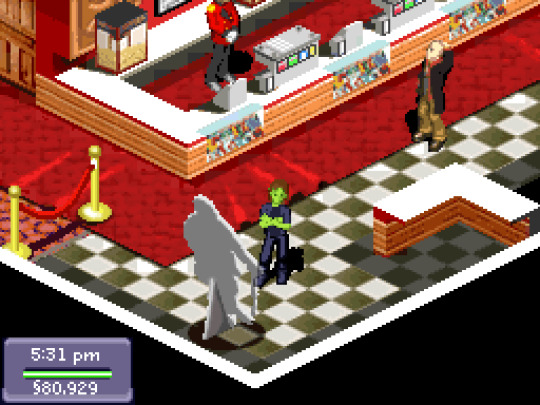
(You could also read it as a difference between Daddy & Luthor's characters. Luthor visits the cinema for idk a meet a greet twice a week (or whatever it is that celebrities do). While... Daddy hardly even shows up to the premiere of his own movie. We think he's dead, of course, and then he barges in at the end to announce that the city is about to be HIS! And then he leaves.)
Lily says that she’s in the movie as well, although she’s portrayed by Anita Tension and only shows up for half of it ("Yes, but only the last half, though I hear Daddy Bigbucks got Anita Tension to play me. That would be fun to see, but alas…"). (Side note: this provides a hint towards how Anita probably looks. And it tells us about the budget of it (big)).
It would make sense for Lily to be portrayed by an actress, but the fact that you could read the movie as having Polly play herself and Lily doesn't get to, is a bit sad.
ANYWAYS. I was thinking about how the advertisements for Tycoon Tycoon! probably looked like. I don't think it does look like the render from a few weeks ago, but Daddy seems to want to portray himself as the "Big, Stern Patriarch of SimNation" and not a gentler "Dad" kinda thing. (Although, the latter would be an interesting take on his character. :p) And he would definitely push everyone else to the background and be the central part of it. So, it could?
i cba to pretend like i have a conclusion here. that is all. thanks for reading.
#urbz#lily gates#luthor l bigbucks#daddy bigbucks#polly nomial#what's up?#i feel like i’m the only person on this planet who actively wonders what daddy’s movie was like#i wonder if it's a “documentary” w/ acted out scenes or if it's a biopic.#the movie that plays in the cinema 100% reads as a documentary. but a biopic would be funnier.#although if it IS a documentary... hiring someone to play Lily Gates is pretty funny and also pretty sad
17 notes
·
View notes
Text
wuthering heights posting #122938: on the abuse being taken seriously
so in an earlier post i said that most of (aka nearly all) the wuthering heights adaptations fail because not a single filmmaker* nor screenwriter takes the abuse that heathcliff and catherine face (at the hands of both their father and hindley, because yes, hitting your children with the rod, neglecting them, and saying you can't possibly love them and, for example, saying to your daughter's face that she's the worst of your children [mr earnshaw's doing] and forcing your adoptive brother into servitude (and there are many articles about this especially in relation to heathcliff's race---i really recommend Maja-Lisa von Sneidern's article Wuthering Heights and the Liverpool Slave Trade for more on this, specifically their posit that "In the novel the Heights, corrupted by the introduction of the racially other [Heathcliff], is the place where the figures of a system of bondage work out their relationships." (Sneidern, 174)) , flogging him, and withholding food from your younger sister as punishment [hindley's doing] are both repeated instances abuse, in different degrees of intensity, but nonetheless have the same impact: it drives heathcliff and catherine's codependency. but this isn't what i solely want to talk about: what i want to actually talk about is heathcliff and catherine's (ultimately) world-shattering decision to visit thrushcross grange. *note: when i say film/filmmakers/screenwriters this includes both cinema film as in movies that both got a mainstream release in theatres and made-for-tv movies and tv miniseries. i'm too lazy to type out "film and tv" every time.
So, in the book, since this is being told from Nelly's (the housekeeper's) point of view, we don't actually know why exactly in the moment Heathcliff and Catherine choose to go to Thrushcross Grange (the manor home of the substantially wealthier Linton family), but it's said later:
""Where is Miss Catherine?" [Nelly] cried hurriedly. "No accident, I hope?" "At Thrushcross Grange," [Heathcliff] answered; "and I would have been there too, but that had not the manners to ask me to stay."... "...What in the world led you to wandering to Thrushcross Grange?" .... [Heathcliff] continued: "Cathy and I escaped from the wash-house to have a ramble at liberty, and getting a glimpse of the Grange lights, we thought we would just go and see whether the Lintons passed their Sunday evenings shivering in corners, while their father and mother sat eating and drinking, and singing and laughing, and burning their eyes out before the fire. Do you think they do? Or reading sermons, and being catechized by their manservant, and set to learn a column of Scripture names, if they don't answer properly?"" (WH, 50-51) (of the complete and unabridged longmeadow press 1983 edition)
Usually, this paragraph is framed in film in one of two ways:
either we actually see this exchange between nelly and heathcliff
heathcliff's reason for why they go to thrushcross grange is shown in either heathcliff or catherine (usually catherine) stating whilst they're out on the moors that she would like to go visit thrushcross grange
In both instances, in most of the film adaptations I have seen, their visit to Thrushcross Grange is played off as a joke---or at least, Heathcliff's reasoning as to why they went is played off as a joke.
Partially, this may be because Nelly doesn't take the abuse that Heathcliff and Catherine face seriously, either: in the very next sentence, she says, ""Probably not," I responded. "They are good children, no doubt, and don't deserve the treatment you receive, for your bad conduct."" (WH, 51) Nelly, an unreliable narrator in case you couldn't tell, vocally does not like Heathcliff nor Catherine, even from when they're children. Because she as a character believes that Heathcliff and Catherine deserve the abuse they face, I feel like many have assumed that Emily Bronte as an author was either implying that the abuse was 1) not that serious or not that big of a deal or was 2) definitely deserved because clearly, even as children and young teens, Heathcliff and Catherine were just that evil. Thus, a lot of filmmakers either consciously or subconsciously utilize that thinking as well. And of course, the other part of it is that the filmmakers themselves have decided that the abuse is either no big deal or is something they don't want to spend a lot of time analyzing.
However, I think that this moment, the decision for Heathcliff and Catherine to visit Thrushcross Grange... I think it's honestly really huge, and honestly really underrated as far as potential scenes to have between them. If this situation was treated with the gravitas it deserves, as in: two very abused and traumatized children see the manor house of the very rich family in the distance, and say to each other, "I wonder how they live. Do they have to suffer like we do?"
And to make matters even deeper (and worse for them), the result of this is that Catherine gets her leg mangled by a dog, and her and Heathcliff's relationship is irrevocably changed by her experiences at the Grange. For five weeks, Catherine is free from her abusive brother, the stress of essentially fending for herself because of his neglect of her, and she gets access to all of the upper class amenities and things she's never had access to before in her life, with people doting on her who genuinely care about her recovery and health. It's no wonder she comes back changed: now she's acutely aware of the life she could lead--if she abandons Wuthering Heights (by marrying into the Lintons) and leaves Heathcliff to fend for himself. Even so, though...she still doesn't want to leave Heathcliff in the dust. Even when presented with the prospect of escaping her abusive household, she only thinks of ways she can use the Lintons' money to help Heathcliff escape with her. AND OF COURSE, we have to talk about how Catherine (white woman) gets the opportunity to escape essentially handed to her and Heathcliff (brown man) has to carve out his own path and do all of the hard work himself and make his own fortune....
IDK!!! I'm RAMBLING!!! but there's a LOT HERE!!!
21 notes
·
View notes
Text
my super cool and awesome friend nabbed me Escape from the 'Liberty' Cinema WITH eng subs, so soon I will be able to experience the 'most original Polish film of the decade'
Everybody say thank you to my cool friend Spex
2 notes
·
View notes
Text
Modern Film Critics are Fucking Idiots.
Like, occasionally, you'll find some poor schmuck working for some big publication that clearly doesn't understand the "Rules" of film criticism in journalism (IE - if people like the movie, it must be bad. Only big corpo movies are allowed to be good.)...but more often than not, it's these self-important, self-aggrandizing, self-entitled soybloggers LARPing like they're the next Gene Siskel or Robert Ebert, like their opinions mean dick diddly.
Like, if a film adaptation is meant to be a love-letter to the community that surrounds the source material of said film? The producers knew who they were aiming the film at, it's not your fault that you're not in that group. See it for what it is, call a spade a spade, and move the fuck on. Report on the numbers. Don't feel the need to drag a film through the mud just because YOU didn't get it, Kyle, everyone else seems to be having a fun fucking time, so apparently YOU might be the one who's wrong, here.
Not every fucking movie needs to be some "Masterwork of Cinema" like some Scorsese Snob flick, the whole POINT of going to the movies is to turn your brain off from the world of reality, escape into some cinematic fantasy, and enjoy some overpriced popcorn in a nice, dark, spacious, climate-controlled theater with an amazing sound system.
Alone, with friends, with family, etc. you get the idea.
Most recent example I can give is the Five Nights at Freddy's movie. Was it a bad movie? No. Was it a bad adaptation? No. Was it good? Surprisingly? Yes. It was (for the most part) faithful to its source material, didn't take too many creative liberties with the IP to the point of making it unrecognizable to the source (Looking at you Resident Evil/Silent Hill/Monster Hunter/Any number of other adaptations)...like, this was a movie made with FNaF fans in mind, and it clearly shows and wears this fact on its sleeve.
A common complaint I see from "Critics" is that the movie "Deters Too Far From the Game's Elements" like...what, you want the whole movie to be Mike, sitting in a stuffy security office, flipping through cameras, locking doors, and suffering ten thousand jumpscares? 6:00 AM rolls by, bell chimes, roll credits? Really? That's what you want to see? When you see a review that says "There's too much plot" like...what? This shit reeks of the whole "Too Much Water" review from the Ruby/Sapphire remakes, y'know? (Doesn't help that it was from an IGN review, as well...)
TL;DR
If the Audience Score on a film is much higher than the critics' score? the movie clearly wasn't made for said critic, or they simply weren't being paid by a corpo to suck the film off like they were holding their family hostage at gunpoint. Critics are entitled to their opinion, yes, I agree, no matter how wrong their opinion may be, they are entitled to it. They just need to stop acting like they're the fucking arbiters of entertainment.
9 notes
·
View notes
Note
“1916 showed us the way!” didn’t it lead to multiple Eastern Europeans leaving their home countries to escape communism? And iirc in the 80’s ussr had to ban a American movie because Russians were surprised that even the poorest Americans could have their own car.
Hmm what happened to the Romanovs? Oh yeah after their murders they are heavily romanticize (heh) and later became saints. That usually happens when the next leaders are worse than the last.
I can say more but Jesus Christ commies are dumb, can someone make Liberty Prime already?
Ya some of the most hokey jerry rigged contraptions in history were made by smart people who were trying to escape their communist utopia.
Also you're thinking of "The Grapes Of Wrath (1940)" staring Henry Fonda, only thing good that ever came from a John Steinbeck novel imho. The Grapes of Wrath (film) - Wikipedia
Although Steinbeck avoided a call from the House of Un-American Activities Committee, the film based on his book, which subtly (many would say openly) criticizes capitalism during the Great Depression by following a family of sharecroppers, received significant backlash from the public.
In the times of the so-called “Red Scare”, such criticism was perceived as “socialist”, “Marxist” and above all ― un-American.

John Carradine and Henry Fonda In ‘The Grapes Of Wrath’
Therefore, when the film was given the “Red Label”, the USSR felt that it was time to step on the stage.
Stalin himself considered that if The Grapes of Wrath managed to annoy the U.S. government so much, perhaps it could be used as a propaganda tool in the country which he governed with an iron fist.
He approved the film to be released in the USSR in 1948, at the time when the Cold War was just “heating” up. This wasn’t a common sight at the time, as cinemas only promoted domestic productions.
Stalin, who had the final say on pretty much everything that was going on in the country, was highly suspicious of foreign movies, which he considered to be “subversive”.
However, in this case, Uncle Joe thought that a film which the Americans label as “socialist” must be heaven-sent in the largest and most influential socialist state of the time.
This was a sound conclusion given that the main subjects of the story ― the Joad family ― are suffering from poverty after losing their farm due to the recession which forces them to become migrant workers.
However, after the film was released, Stalin’s idea completely backfired. In the film, it appeared as though even the poorest owned an automobile ― a luxury that was off limits to an ordinary Soviet citizen at the time. Instead of evoking anti-capitalist sentiment among the common folk, it was as though the only thing the viewers could see was the difference between being poor in the USA, compared to their own experience in the USSR.
While the USSR boasted itself as the country that belongs to the peasants and the workers, Stalin had, in fact, canceled many of the privileges that were gained during the country’s first years. ___________________
Romanov's suffered from blue blood, but yes they were absolutely slaughtered, SOP for royalty generally speaking.
Last Czar of Bulgaria, Simeon Borisov von Saxe-Coburg-Gotha (you may recognize some of those names at the end, they're all related to each other) is still alive and served as Prime Minister there for 4 years so don't always get murdered.
Another fun bit with the commies is they blame capitalism for their own failures too, 'US didn't trade with them so they didn't have enough food' kind of thing.
hunger makes you dumb, we should have a give a snickers to a commie day, might help
10 notes
·
View notes
Text
The World’s Most Iconic Firearms and Their Fascinating Histories
Guns have played a transformative function in influencing the course of our development, from reshaping warfare strategies to influencing cultural identities and national defense laws. As man-made devices that have progressed dramatically since their original inception in the early gunpowder era, guns have become both emblems of authority and essentials for security. Their advancement reflects not only technological progress but also global policy changes. From the initial hand cannons to today’s Winchester and military-grade rifles, ballistics are synonymous with a controversial fusion of functionality, controversy, and engineering.
The use of arms in defense settings is undeniable. As devices of defense and conquest, they have reinvented combat dynamics, allowing compact armies to withstand opponents against massive forces. The advancement from long-barrel guns to mechanized weapons, then to modern-day rapid-fire firearms, has enabled defense units globally to amplify their effectiveness, while also raising philosophical dilemmas about the reach and intensity of military engagement. Today’s defense systems invest large sums into firearm development, with advancements like smart optics, reconfigurable designs, and non-lethal alternatives getting attention as global security dynamics transform.
In everyday society, personal weapons represent different meanings depending on location and legislation. In some parts of the world, firearm possession is considered a cultural principle or cultural heritage, often associated with personal defense. In others, tough regulations and public perception make having firearms rare and prohibited. The discussion around civilian access to firearms focuses on the conflict between the individual liberty and crime prevention. Tragic events, firearms misuse, and unlicensed distribution have prompted policymakers to tighten their weapons regulations, sparking emotional debates across all ideological lines.
Security institutions across borders use weapons as part of their toolkit to maintain public order. Training, oversight, and the proper firearm usage are critical components of responsible policing, and different jurisdictions have vastly distinct philosophies regarding when and how officers should be allowed to carry firearms. While some places require everyday carry, others focus on non-lethal means and reserve firearms for elite teams.
Beyond their utility, firearms have deeply influenced media, cinema, novels, and even lifestyle. From Western films and military blockbusters to detective novels and digital entertainment, firearms are often shown in ways that sensationalize their capability. This cultural representation can sometimes create illusions between entertainment and truth, shaping opinions and playing a role in wider discourse about armed conflict and regulation.
In today’s modern age, the debate surrounding firearms is more complex than ever. Progress in arms development, arms pacts on arms control, and rising consciousness around emotional stability and harm reduction influence how people approach this sensitive topic. While firearms may never escape debate, they remain an undeniable part of the history of mankind, urging measured laws, responsible ownership, and constructive conversation about their role in a well-governed planet.
Wildebees Outdoor 243 3rd Ave, Bredell, Kempton Park, Gauteng, 1623 +27 11 396 1622 https://maps.app.goo.gl/3fW89z4txDf5MwYk8
0 notes
Text
Cinemagooey Goes to Paris
In honor of the Festival de Cannes 2024, Cinemagooey salutes three magnificent French actors transcending generations.
Bonjour de Paris!

In the City of Lights, film is a serious art form. And rightly so, considering the French graced the world with several transformative firsts: the first movie projector (invented by brothers Auguste and Lois Lumière), the first use of special effects and fictional narrative (George Méilè) and the creation of New Wave, which burst onto the scene in the 1950's, introducing the auteur director and totally upending the art form (for a sampling, look up François Truffaut and Jean-Luc Godard).

An existential Jean Seberg in Jean-Luc Godard's New Wave movie, Breathless (1960)
In addition to introducing the cinematic world to these teutonic shifts, the France also bequeathed the universe with phenomenal actors. Here's a look at three luminous French actors who have delighted and thrilled movie audiences worldwide.
Catherine Deneuve

Catherine Deneuve, a star since the 1960's, makes us dumbstruck. When we find our words, we can only say "Elle est magnifique!" She is an institution, revered in France. Deneuve danced onto the world stage and into critics hearts at nineteen years of age in The Umbrellas of Cherbourg (1964). Her fame continued to skyrocket after the movie won the Palme d'Or at the Cannes Film Festival and was nominated for four Academy Awards in 1965.
Born in Paris to stage actors, Deneuve captured the imagination of directors as Roger Vadim and Jacques Demy, starring in several movies, including a film featuring older sister François Dorléac in The Young Girls of Rochefort (1967). Dorléac, a star in her own right, appeared in several movies and modeled for Dior before her tragic death in 1967 from a car crash that left Deneuve bereft.

The talented Francois Dorléac, who left the cinematic world too soon in 1967. She and Deneuve were close growing up and Dorléac served as Deneuve's role model in the industry
Deneuve's impressive career has spanned six decades. If you want to check out this incredible talent, try the erotic Belle de Jour (1967) in which Deneuve plays a housewife turned prostitute to escape domestic boredom; the American romcom The April Fools (1969) alongside the delightful Jack Lemmon; or the french comedy Potiche (2010), the story of a trophy wife who unwittingly takes over her husband's umbrella factory.

Deneuve, bored out of her gourd in Belle de Jour

Jack Lemmon romances Catherine Deneuve in The April Fools

2010's Potiche
In 1985, Deneuve was vaulted to goddess-like status when the French government named her as the official face of Marianne, the national symbol of liberty.

Deneuve as Marianne...or Marianne as Deneuve?
Today Deneuve is 80 years young and unstoppable. Deneuve wowed audiences at this year's Cannes Film Festival as she promoted her new film Marcello Mio which is about...get this...her real life actress/daughter Chiara Mastroianni who decides to dress and act like her father, actor/director Marcello Mastroianni (Deneuve's former love interest). Meta cinema, anyone?
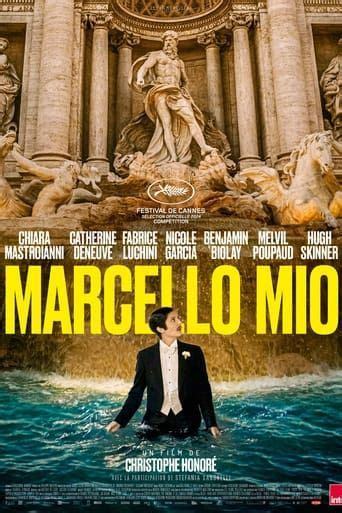
Marcello Mio...what a meta concept

The inimitable Catherine Deneuve at the 2024 Cannes Film Festival
Cinemagooey crowns Deneuve as the reigning Queen of French Cinema!
Juliette Binoche
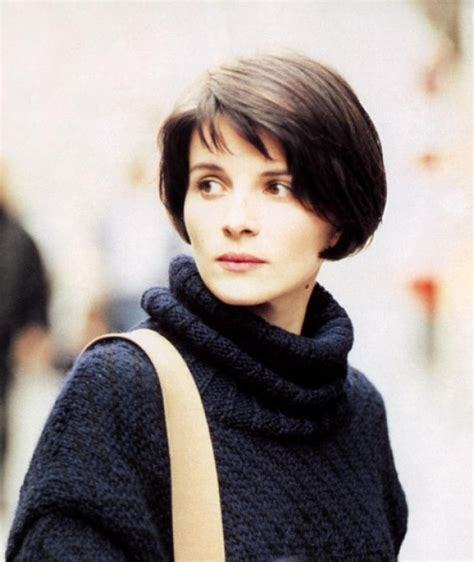
Juliette Binoche, a native of France, is a star of the world. She's a shimmering, international icon who has graced the silver screen in 60 plus films and was awarded both an Academy Award and a BAFTA for The English Patient (1996), a Cannes Film Festival Best Actress Award for Certified Copy (2010) and a César Award, France's highest film honor, for Three Colors: Blue (1993).
Born in Paris, Binoche was left bereft and abandoned as a child when her parents divorced and she was sent to boarding school, spending holidays with her grandparents while her parents pursued their own individual paths. Acting proved to be her salve and salvation and she amazed audiences from the beginning, starring in Jean-Luc Godard's Hail Mary (1985), a contemporary tale of the virgin Mary. She continued to appear in dozens of films, wowing audiences with such stunners as the reputed auto-biographical The Clouds of Sils Maria (2014) featuring Kristin Stewart and Chloë Grace Moretz and written and directed by Olivier Assayas.

As Hana in The English Patient

Hiking with Stewart in The Clouds of Sils Maria

Delivering a sumptuous performance in the foodie film The Taste of Things
She continues to dazzle in 2024 with the release of her latest film, The Taste of Things.
Always a darling at the Cannes Film Festival, this year she gave a moving, tear-filled tribute to Meryl Streep, presenting her with the prestigious Palme d'Or.

Binoche tearfully embracing Streep
Lea Seydoux

In 1985, just as Juliette Binoche was making a name for herself in the cinema world, Lea Seydoux was born in Paris to a well-known entertainment family - her grandfather is the chairman of Pathe, a major french film production and distribution company. As a child she rubbed elbows with Mick Jagger and Christian Louboutin. After abandoning her dream to be an opera singer, Seydoux turned to acting and quickly made a name for herself.
Seydoux played supporting roles in Inglorious Bastards, Midnight in Paris and Mission: Impossible - Ghost Protocol. But it wasn't until 2013's Blue is the Warmest Color that she became an international superstar, garnering a coveted Palme d'Or for the role (although not without some controversy).

Seydoux with Owen Wilson in Midnight in Paris

With Adèle Exarchopoulos in Blue is the Warmest Color.
Seydoux has since appeared dozens of films, including Wes Andersen's The Grand Budapest Hotel, No Time to Die, and Dune: Part Two.
Currently Seydoux can be seen in the sci-fi romance The Beast (2023), as a woman traveling through space and time to find true love.

Time traveling to the 1910's in The Beast
Deneuve, Binoche and Seydoux are the true femme trifecta of superstars.



#cinema#films#movies#catherine deneuve#juliette binoche#lea seydoux#cannes 2024#cannes film festival#belle de jour#the taste of things#blue is the warmest color#french actress
1 note
·
View note
Photo

Ucieczka z kina Wolność
aka Escape from the 'Liberty' Cinema
Director: Wojciech Marczewski
1990
imdb
Silesia Film
#ucieczka z kina wolność#silesia film#escape from the liberty cinema#comedy#drama#fantasy#tape#cassette#vhs#video#cover art
3 notes
·
View notes
Text
Side by Side
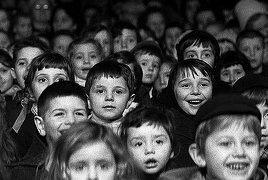
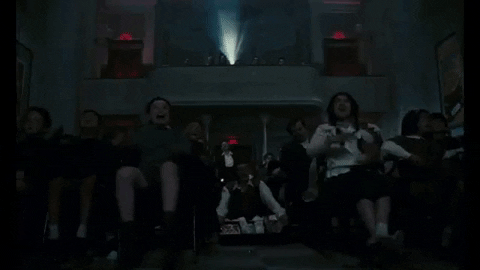
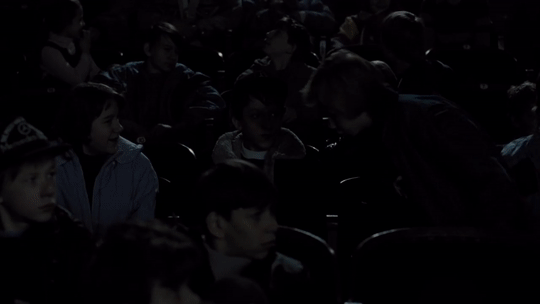
Les 400 coups (1959) François Teuffaut
Nuovo Cinema Paradiso (1988) Giuseppe Tornatore
Escape from the Cinema Liberty (1990) Wojciech Marczewski
#side by side#comparison#movies#les 400 coups#i 400 colpi#françois truffaut#nuovo cinema paradiso#cinema paradiso#giuseppe tornatore#cinematic parallel#escape from the cinema liberty#wojciech marczewski
90 notes
·
View notes
Photo
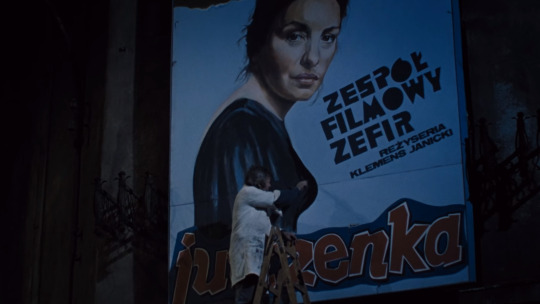
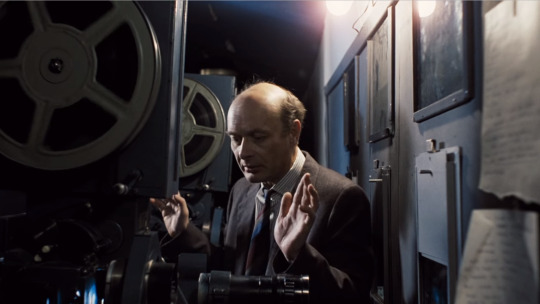
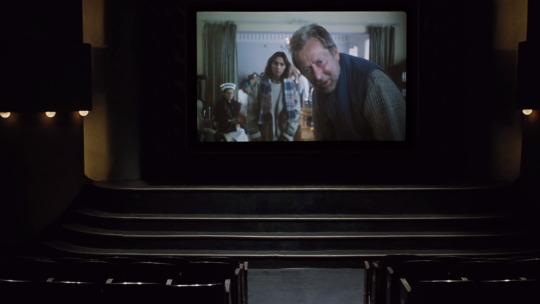
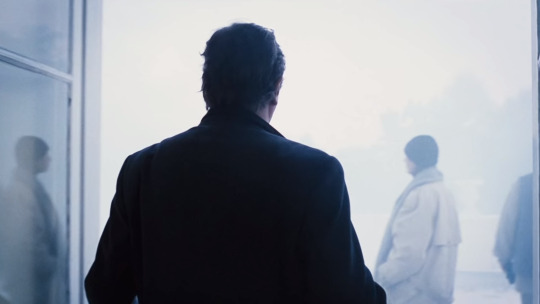
“Ucieczka z kina Wolność”, 1990
3 notes
·
View notes
Photo




Escape from the ‘Liberty’ Cinema | Wojciech Marczewski | 1990
Teresa Marczewska, Janusz Gajos, et al.
#Teresa Marczewska#Janusz Gajos#Wojciech Marczewski#Escape from the ‘Liberty’ Cinema#1990#Escape from the Liberty Cinema
74 notes
·
View notes
Note
I’d love to hear about your fucked up subway, as best as you can express. Love love love hearing about weird dreams!
In exchange I’ll tell you about my recurring Bad Mall— I’m not on any meds my brain is just like this— usually I’m at the mall looking for someone. Usually it’s a friend, sometimes it’s All Might (??? Also haven’t seen BNHA in years why he there), and in one notable instance, it was a blue sock puppet who everyone loved.
I don’t know why I hate this mall so much. If I could I would never have another mall dream again. It is, technically, a very nice mall. The employees are nice. Usually I have a friend there. The shops are interesting and fairly priced. But something about the atmosphere is just… *grey*. Sapped. It’s a big loop of a building, sized such that there should be a courtyard in the middle— there is not.
The main entrance borders a clothing store that also sell luxury nail polish (like… made of velvet) and a decadent chocolate shop that gives out really nice free samples. Across the way there’s a couple jewellery stores I’ve never been in, and then you make a sharp left and you’re into the mall proper. To your right, the food court. I’ve only stopped there maybe ever twice, and the food is really good. The second time I accidentally put someone else’s fried chicken order into an incinerator so we got married about it.
On the other side, there is GameStop. This store is the bane of my being. It always has the *coolest* stuff but if I dare set foot inside the dream will start looping around it— genuinely, one time I tried to escape by running to the other side of the mall, and I ended up in a secret passageway that led me right back to GameStop. The worst part is that it’s all dream stuff. I don’t get to take any purchases home.
Past that, on the right there’s kind of a weird store that sells vintage stuff, old video games, and tshirts. On the left is a shop that sells gnomes. Directly ahead is a Walmart, and, in the middle of the like. Mall hallway. a free floating hot drink store that also sells wooden cutouts of deer, and kickass hot chocolate. Turn left.
I haven’t been in any of these shops. The only one I recall clearly is a big, outdoorsy-themed sportswear shop to the left. It has a full sized pool in it. I’ve never been inside, only pressed my face to the glass. It also seems to have some sort of scavenger hunt happening with bits of shredded paper. Usually I hurry through the rest of the hallway, not sure why. Turn left.
On the corner to your left, there’s the shop where one of my friends works. The only thing I remember about it is a wind-chime made of dvds. To your right is a large store that takes up the entire stretch of building— it’s one of those, like, VR experience places. Past that, on the left, there is a cinema. Turn left.
You’re back where you started, now. You can go outside. The parking lot is huge, and there’s a MASSIVE textiles store you can only access from out here. Don’t go to the stuffing area, bad vibes. There’s also a handful of gacha machines. One is easily lockpicked, and has cool Pokémon stuff inside. Another has little historical artifact recreations that are all slightly wrong. The Mona Lisa but her hair is blue. The Statue of Liberty, but the torch is a bundle of snakes.
There’s another bundle of disconnected shops. One of them sells pizza? And also it always wakes me up instantly so I don’t know what the pizza is like. The mall doesn’t always spit me out into the parking lot, either. That’s just part of the mall experience I guess one second you’re walking away with your shopping the next you’re running for your life in a dream video game c’est la vie
Hey anon I fucking LOVE your nightmare fucked-up dream mall. If this was the setting of a 16-year-old forum post creepypasta that only exists in reposts and screenshots I'd read the hell out of it.
To your right, the food court. I’ve only stopped there maybe ever twice, and the food is really good. The second time I accidentally put someone else’s fried chicken order into an incinerator so we got married about it.
^Highlighting this because it's doing a lot for me.
My fucked-up subway does not have nearly as much lore as your fucked up mall, and most of my feelings about the fucked-up subway are rooted in the heightened emotional ether of dreams where everything is slightly wrong, but I'll take a shot at capturing the vibes.
The first hallmark of fucked-up subway stations is that they are deep and they are vast--and by vast I mean there's often endless dead-space fanning out from the platform. The stairs descending to the platform are often unrailed and give you a wide view of the endless black-void expanse that stretches beyond the platforms.
The structure of the tracks and the trains is a lot more like a rollercoaster than a real subway. The tracks are bare and exposed and peter off into the dead-space distance. The cars are small and often roofless. They're often some combination of cold and wet and exposed. When there's no roof, there's usually the latent understanding that if you fall out you'll fall far.
The fucked-up subway trains run very infrequently. Usually when you get to the fucked-up station, the train in your desired direction is just about to depart, and if you miss this one, the next one will not be for a long time.
The fucked-up subway trains go to stations that do not exist. They're always modeled off the subway routes in my home city, which I've lived in for close to 5 years now and whose subway system I know like the back of my hand. This means you'll always know where you're trying to go, and be confident in how you're getting there, until you realize the subway is headed to the stations that do not exist.
The stations that do not exist often have transfers with other subway lines, which you can take in an attempt to get back on track. These transfers follow the same rules as the infrequent trains--the train and direction you need will always be just arriving when you are, and if you miss it you'll be stuck waiting a long time. Usually to transfer you have to descend to a deeper level, which brings you to more of these vast and dark and precarious platforms hanging over the abyss, with exposed traintracks running on either side. Sometimes you'll accidentally descend the wrong side--inbound instead of outbound, or vice versa, and need to hastily backpedal (or come up with some way to get across to the other side of the chasm).
One dream with the fucked up subway system had the deep, deep subway system. This station goes all the way down. No clue at all how deep but I'll call it 30 floors, at least, into this dead and lifeless, lightless trough at the bottom. The very bottom has no train, it's just the very bottom of everything. It's a bit like being at the bottom of the ocean, or the bottom of an almost pitch-black cellar--if that cellar's walls were hundreds and hundreds of feet above your head. There is a shop down here! It sells frozen meats that are kept very well preserved down here due to the cold and lifeless nature of the trench's pit.
It's not really a shop, per se. There's no staff or anything. It's more like you've discovered the abandoned contents of this cellar. Things are just stacked around, and very very hard to find with so little light. I don't remember how paying works.
Sometimes, you'll go to a station that exists, but it'll be wrong. You're at the correct station but nothing about it or its surroundings is correct. Nothing looks right. You recognize nothing. But it is the correct station. Sometimes this is nice. One time it let me out into this very pretty street with a nice red brick church whose yard and stone wall were surrounded by beautiful flowers. I met a friend here and she disappeared.
The fucked-up bus lines exist, and they go south. I've only ever ridden them at night and in the pitch black, and they run to places that aren't safe. This is a problem because they run infrequently, and you have to wait for them outside in the dark. I took the fucked-up bus line to a church way south of the city, where I was helping a nice couple set things up in the church. They were never there while I was. The church was always dark.
On the way back taking the fucked-up bus, there was a stop in the middle for the driver to rest. I talked with the other riders while we waited. The bus driver had a medical episode and drove the bus over the side of a nearby cliff. I don't remember what happened when we tried to get help.
113 notes
·
View notes
Text
I THINK I FOUND IT
gonna have to figure out a way to download it bc my computer doesn't have wifi
fuuuuck dude found a really cool movie i wanna watch but i don't speak polish and the only version i can find online only has Korean subtitles, and I can't read Korean either
7 notes
·
View notes
Text
Sleeping Beauty Spring: "Sleeping Beauty" (1959 Disney animated film)
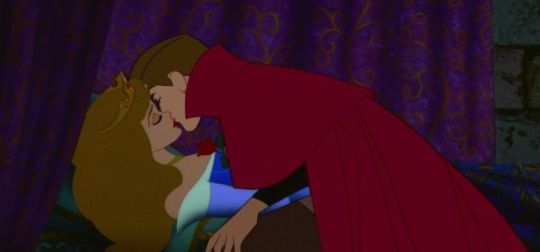
In contemporary American popular culture, this lavish animated feature defines the story of Sleeping Beauty. Countless children have grown up with this version of the tale, not just through the film itself, but through dolls, picture books, Halloween costumes, t-shirts, accessories, and visits to the pop culture icon that is Disneyland's Sleeping Beauty Castle. Yet as an adaptation of of the fairy tale, it plays particularly fast and loose with the original plot. But the liberties it takes work to its advantage. Disney infuses the tale with emotion, conflict, and action that more strictly faithful adaptations lack, but which suit the art form of cinema.
The film's first and foremost departure from the classic tale is to flesh out and humanize the fairies, rather than portraying them as just ethereal agents of fate. The three good fairies, Flora (voice of Verna Felton), Fauna (Barbara Jo Allen), and Merryweather (Barbara Luddy), are small elderly ladies, each with her own distinct, endearing personality. In sharp, powerful contrast to their goodness and warmth stands Maleficent (Eleanor Audley) – not the mere angry fairy of tradition, but a majestic dark sorceress, the self-proclaimed "mistress of all evil," and one of Disney's most iconic villains. Flora, Fauna, and Merryweather are the true protagonists of this film, as the story is rewritten to revolve around their efforts to save Princess Aurora (voiced by the golden-toned operatic soprano Mary Costa) from Maleficent's evil magic.
After Merryweather softens Maleficent's curse on Aurora from death to sleep, the three good fairies take further steps to try to prevent the curse from coming to pass at all. In another drastic departure from the traditional tale, King Stefan and his queen entrust their baby daughter to the fairies, who disguise themselves as peasant women and raise her as their foster child in the forest, changing her name to "Briar Rose." (Thus her name from the Grimms' version of the tale and her name from Tchaikovsky's ballet both get their due.) They plan to take her back to the castle at sunset on her sixteenth birthday, when the curse will end, to reunite with her parents and to marry her betrothed, Prince Phillip (Bill Shirley).
Sixteen years later, in the forest, Briar Rose and Prince Phillip meet by chance and fall in love, neither knowing the other's identity. Afterwards, Briar Rose is distraught to learn her own royal identity and betrothal, because it means leaving her "peasant boy" behind. When the fairies take her back to the castle, they allow the sad princess a few moments alone. Unfortunately, Maleficent seizes the chance to hypnotize Aurora and leads her up to a tower where a spinning wheel waits.
As the fairies put the whole royal court to sleep along with Aurora, they learn that the young man she met in the forest was, in fact, Prince Phillip. But Maleficent captures and imprisons the prince to prevent him from waking Aurora with true love's kiss. This leads to what may be the most dramatic change from the traditional story: Aurora and the court's enchanted sleep doesn't last for a hundred years, but just one night, the length of time it takes for the fairies to help Prince Phillip escape from Maleficent's dungeon and reach King Stefan's castle. After Phillip chops through the forest of thorns Maleficent creates to bar his way, Maleficent transforms herself into a fire-breathing dragon, and an epic battle takes place. In the end, of course, the dragon is slain, and Phillip's kiss wakes Aurora, who finally meets her parents and takes her place as princess by her prince's side, while the good fairies happily look on.
Walt Disney set out to make Sleeping Beauty his greatest animated feature thus far, and its visual spectacle and elegance have rarely been equalled before or since. With artist Eyvind Earl as the animation's chief stylist, the entire picture has the look of a rich medieval tapestry, combined with with sleek traces of 1950s modern art too, and the film's widescreen Super Technirama 70 format gives it an epic dimension far different from Snow White and the Seven Dwarfs or Cinderella. The visual beauty is enhanced by the classical-flavored musical score by George Bruns, based on motifs from Tchaikovsky's ballet – of the few songs sung by the characters, the standout is the main love theme, "Once Upon a Dream," based on Tchaikovsky's famous Garland Waltz. Some critics might find the whole atmosphere too sophisticated and serious compared to other, livelier films in Disney's animated canon. But the excellent voice cast brings their roles to life, and the film's focus on Flora, Fauna, and Merryweather adds warmth, lightness, and gentle humor to balance out the medieval elegance.
While I can't say if Walt Disney succeeded or not in making Sleeping Beauty greater than all his earlier animated features, it's most definitely one of the crown jewels of the Disney animated canon. And while it's not the most faithful retelling of the classic fairy tale, its sheer artistic quality as a film is hard for any other version to equal.
@ariel-seagull-wings, @thealmightyemprex, @faintingheroine, @reds-revenge, @the-blue-fairie, @comma-after-dearest, @themousefromfantasyland, @paexgo-rosa, @thatscarletflycatcher
62 notes
·
View notes
Text
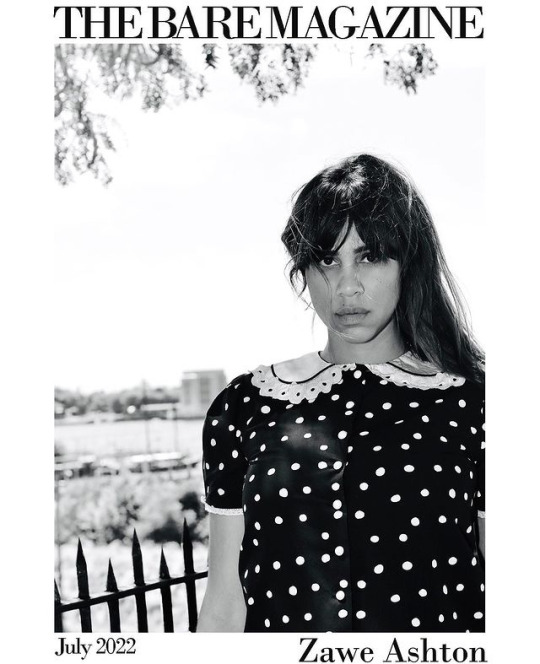
Zawe Ashton is one of the most enchanting and talented British actresses to have graced our studio. Zawe is currently earning raves for her work in Mr. Malcolm’s List playing Julia Thistlewaite, a young woman jilted by London’s most eligible bachelor (alongside a stellar cast, which includes Freida Pinto, Ashley Park, and Theo James). We had a blast shooting in Brooklyn where she was about to attend the NYC premiere. One of our favorite designer and muses Batsheva picked a few frocks that worked well for Zawe’s swiftly changing shape. For now consider a wonderful escape into Mr. Malcolm’s world if you haven’t already…and check out Zawe’s favorite green clean beauty and lates bare essentials.
The Bare Magazine: Can you share a bit about the New York City screening of “Mr. Malcolm’s List”?
Zawe Ashton: It was an amazing thing to open this film in New York, one my favorite cities in the world—made more special by my time spent on Broadway in 2019 before all the theaters shut down because of the pandemic. The response to the movie has been so warm and so supportive, we’re so grateful as a team. We’re an independent film that took 27 days to make up against some huge franchise releases this summer, so it means so much to see the positive responses. Being here in the city, safely, after shooting this film in deepest lock down in Dublin, is such a wonderful full circle. To be part of the new wave of theatrical releases, encouraging people back to the cinema feels tremendous.
Bare: Did you enjoy your visit to our Brooklyn studio as much as we enjoyed having you?
ZA: I adore Brooklyn, I love being by the water in the city. As if you have the Statue of Liberty at the end of your street! In another multiverse, I’m an achingly cool photographer living and working in Brooklyn, with a light filled studio just like this!
Bare: What do you hope viewers take away from this film?
ZA: I think this is a very kind film. We need that right now. There are serious threats we face in our world. As an artist, I can try and polish my corner as best as possible and put work out there that feels like it helps in some way. This film is pure escapist rom-com-regency-romance joy! It’s pretty much the first feature film in this genre with an inclusive cast in leading roles of all types—romantic lead, protagonist, antagonist.etc. It’s a needle mover in that way and there’s a real powerful legacy to that, as well as it being so light and wholeheartedly entertaining. I had so many formative experiences watching films of this genre, mostly because I had grown up wanting to see my imaginings of books of this era brought to life, and when they were , no one in them looked like me. So, if we can change that formative experience for the next generation, as a team of actors, we will have fulfilled a purpose beyond just movie making. I also have a real intentionality in my work to amplify the visions of fledgling female filmmakers, and Emma Holly Jones has delivered her first feature with Mr. Malcolm’s List along with an all female producing and writing team. So, there’s lots of reasons to support this film!
Bare: You mentioned in our studio that you are trying to use clean everything, especially lippies...are there any all-natural beauty products you’re especially into lately?
ZA: You’ve just introduced me to Pacifica, which I’m already obsessed with! Their coconut cream deodorant is amazing, it’s not sexy to talk about deodorant necessarily but so many of them are toxic and can cause chemical build up in that very vulnerable area near the breast. I’m loving their vegan lip oils—actually really pigmented and so moisturizing at the same time. Grown Alchemist is also a new favorite. Their hand cream is so rich and comforting, which is still needed with the hand sanitizing! All their bath and body range is delicious. It feels nice to start the day as cleanly as possible and forgive yourself if you potentially go downhill from there
Bare: You have great personal style. Has it been challenging getting dressed/styled for red carpet events now that your body is changing?
ZA: That’s very kind. I will say that it was a rude awakening to find that red carpet maternity dressing is pretty much nonexistent. I felt very lucky to have Sabina Bilenko, a couture house who’s ethos I really believe in, support me for the special night. I’d love to contribute to an initiative that can plug the gap in that market in a sustainable way.
Bare: And finally, please list your top 5 Bare essentials.
ZA: Pacifica Glow Stick Lip Oil in Crimson Crush; Fenty Beauty Cheeks Out Freestyle Cream Blush in Petal Poppin; Milk Makeup Kush Fiber Brow Gel; Kevyn Aucoin Stripped Nude Skin Tint, and Charlotte Tilbury Pillow Talk Mascara.
59 notes
·
View notes
Text
Trustworthy
Sooo... I can’t stop thinking about the new spoiler trailers from Mundo Gloob and I had to write this Episode 1 / Season 4 fix-it fic to make my heart happier.
This is purely based on MY HEADCANONS and ASSUMPTIONS from the recent SPOILERS.
WARNING: SPOILERS FROM SEASON 4 EPISODE 1
AO3
Fic under the cut:
“Am I so untrustworthy for you?”
Luka already regretted the words that escaped his mouth. ‘What am I saying?’
“That’s not it, Luka…” Marinette directed her gaze to the floor. “I really like you and I trust you but-” she bit her lip. ‘I can't tell you. It’s too dangerous for you to know’, she couldn’t finish.
Of course she wanted to tell her boyfriend the truth. Of course she wanted Luka by her side. And obviously she hated to interrupt their dates as much as he did. But it was because he was so important that she couldn’t get him involved- in danger! Especially when Hawk Moth knew he used to be Viperion and could take advantage of that.
She hated lying. She hated making Luka feel untrustworthy. Yet she could do nothing about it… Trapped with her guardian duties and responsibilities- the weight of the world on her shoulders with no way out...
“But what, Marinette?” his mouth moved on its own. “What’s holding you back? I want to help and be your support. Can't you rely on me?”
She couldn’t answer. She couldn’t tell him the truth he wanted to know, no matter how much she wished to.
Frustration turned into whimpering, and Luka felt the urge to hold her as he usually did.
But he couldn’t.
What was he even saying? Why was he pressuring his girlfriend into confessing something she clearly didn’t want to share? Maybe it was not fair to him- but it wasn’t fair to Marinette either.
His fist clenched so tight that his nails were sinking deep into his skin, hurting, but not as much as the pain tearing his heart apart.
'I made her cry. I promised to be there when she needed me. To let her be herself with me. To share only what she was willing to share. Yet- why did it turn into this? Why can’t I be reliable?'
He was lonely. He just wanted her to share her burden with him- to understand what was going on in her mind when her face sometimes turned dark, especially when she looked at the photo of the Chinese old man on her phone.
What kind of boyfriend was he, making his girlfriend uncomfortable like that?
It broke his heart to see her cry and be unable to do anything at all. ‘Why can’t I move? Why can’t I help her instead of making her feel worse? I just want to know the truth to support her!'
Before he could give it a better thought, a black butterfly entered the pendant Marinette had just given him that same day- before interrupting their date to the cinema, and silence engulfed him…
_______________________
What happened in-between that moment and the instant Ladybug appeared in front of him, casting her magical power was unknown to him.
He had been akumatized.
Again.
He had tried to force Marinette. Attacked her. Maybe even harmed her...
“Is Marinette ok!?” he nearly cried in front of a worried Ladybug, who nodded to his relief.
When Marinette came back to Luka, moments later, she had tears in her eyes- and he knew he was the reason for them. She jumped to his chest and said nothing. Her thin arms surrounded him in a strength he wasn’t aware she owned.
“I’m so sorry, Marinette. I should have never- I have no excuse”
“No, Luka. It’s ok to be upset. I would be upset too- No- I am upset too. You deserve better than what I can offer… I can’t keep making you feel like this…”
“No, that's not- Are you breaking up with me?”
“No! Yes… I don’t know! I- I don’t want to break up with you… But I can’t give you what you’re asking me. I can’t be better than I am. I don’t want to keep making you upset” she let him go taking a step back, eyes locked to her shoes. "I’m so sorry… I just want you to be happy” ‘and protect you’ she kept to herself.
Luka said nothing for a long minute.
And suddenly, he pulled her in a hurt hug, surprising the girl.
“I’ll always be around if you ever need my support...”
That said, Luka slowly broke the hug and turned his back to her as he started walking towards the Liberty.
“Luka!” Marinette cried. But if he heard her, he ignored her call. Her feet couldn't move as tears felt down her face. 'I can't. I have to let him go to protect him… even if it hurts so much...'
That night the kwamis tried to cheer Marinette up without much success, until she finally fell asleep after exhaustion from crying uncontrollably.
_____________
Back at his cabin, Juleka had a worried look, but didn't say anything. Luka closed the partition of their shared room and started playing to put his thoughts in order.
'What happened to me? How could I demand more from Marinette? Attack Marinette? Or whatever I might have done as an akuma. I should be happy that she returns my feelings. When did I become so greedy? Why can't that be enough? I should be supportive instead of putting more pressure on her shoulders. Why can't I just support her?'
'I really am untrustworthy…'
That was his found truth.
__________________
Months passed in isolation. If they ever met, there were short, cold awkwardly sad greetings and nothing more. She never came back to the Liberty again. She stopped contacting Juleka- but Luka’s sister assured it wasn’t his fault. He focused on his music, even if he could only compose sad songs that could never match Kitty Section's style.
It was one rainy day, during one of his deliveries, when Luka found Marinette crying at the park next to her house, curled behind a tree under the rain. She was looking absolutely broken, the most miserable he had ever seen her, and didn’t blink an eye before jumping down from his bike in a hurry to comfort her.
She desperately held him, in despair, stronger than the day they told each other their farewells.
“Marinette? What happened?” he asked in concern.
Marinette reacted to the voice she had deeply missed, and her pain grew wider in her heart.
“Luka… I- I can’t take it anymore…” she whimpered. “It's over. Lila won- I've been expelled for good and I’m all alone now… I have no friends, my parents don’t trust me and- and you-” ‘I miss you’ it almost escaped her.
“Lila? That liar?” he asked, surprising Marinette.
Of course he would know after meeting her… She let a weak affirmative hum out. “It’s over,” she repeated. "I hate it so much…"
She crumbled.
And, like always, Luka was there to comfort her. He had understood her better than anyone- and he even supported her despite the pain she had caused him.
Why didn’t she notice that fact earlier?
She needed his support. She could- she should have come to that decision earlier. He had proven to care about her more than anyone. Even when akumatized he never hurt her- the way he had touched her lips as silencer when she was Ladybug, avoiding being harmful to both herself and her superhero persona- and then again, as Truth, when he had changed his mind at the last moment and let her go without casting his spell on her…
“Marinette… We’ll fix this. You’ll always have me...” he paused, looking for a word that didn’t add even more conflict to her “As your ally- for whatever you need me”
Luka’s hurt voice rang in her ears, and his hope was the final straw to her determination.
“I am Ladybug…” she whispered, low enough for the rain to cover her voice, but loud enough for Luka to hear her, as his body jolted and his shocked face showed.
He pulled her even closer. His arms surrounded her weak body, his nose buried in her hair and his mouth pressed on the top of her hair.
Everything made sense, he realized. Too much sense. He felt stupid for not realizing it earlier.
“I’m so sorry- I could have never imagined the weight you carry on your shoulders. I’m sorry for not noticing earlier and being there when you needed me. I’m sorry for having pressured you to this point…” he silently lamented. “And I’m sorry you just had to tell me the truth you wanted to keep from everybody.”
“Luka… I- I can’t take it anymore. I’m sick of responsibilities, burdens, distrust… I’m more alone than ever… I don’t want to be alone- I don’t want to be the guardian anymore.”
“I wish you didn’t have to carry this weight alone. I already knew you were so amazing and strong… I never realized how much. But Marinette. You have me. Just tell me how I can help, and I’ll be your support whenever you need me to. I'll do everything I can… anything you need… Let me be your support. You don’t have to be alone anymo-"
Luka suddenly stood up, sentence unfinished, and Marinette turned to look at him.
"Use me.” he said, turning his back to her.
"Use you?"
She understood what he meant a second later when a dark feather and butterfly transformed him again into Truth, making Marinette gasp in absolute horror.
Shadow Moth had been aiming at her- she realized- and he had protected her.
Once again.
"Marinette. I'll expose Lila's lies for you. Just wait."
"No, Luka!" She cried. What if he attacks her as Ladybug? What if Hawk Moth entered his mind and found out her identity? She was too vulnerable to fight. Terrified. She needed someone- No. She needed to bring Luka back.
She couldn't give it a further thought before she transformed into Ladybug and followed him and his sentimonster.
The fight was over before she could step in.
Luka - Truth- had done it.
She saw with her own eyes how Lila's lies were exposed, in front of everyone. The faces of rage and betrayal from her friends. The regret of her parents… and Truth- Luka, broke his akumatized objects himself. He seemed to have never lost his conscience. Serene. Calm. Satisfied of his 'justice’.
And more than that he looked relieved. Relieved to see how all her friends started trying to contact Marinette to apologize.
"Ladybug!" He called, and she snapped out of it to purify both the akuma and the amok.
“Miraculous Ladybug!”
____________________
It had been months since Marinette last stepped into the Liberty, but the next day after Lila’s lies were exposed, her feet automatically moved there- remembering the path she had been happily taking a long time ago. Having hurt Luka's feelings made her awkward around him, and they unavoidably distanced themselves from each other, even if the strong feelings they felt for each other remained.
"Long time no see, lady." Anarka greeted. "Are you here to see Juleka?"
“Captain.” Marinette jumped a little. "I- ugh. No. I- I'm here to see Luka. Is he here?"
A relieved smile showed in the woman’s face. "He's at his cabin. Come in. You know the way."
The Liberty was even messier than she remembered, untidy and with dust everywhere. She wasn’t sure if that was a good or a bad thing, but she liked re-encountering with the ship’s familiarity.
And there was Luka. Meditating, exactly like the first time they met. She was staring, she knew- but she couldn’t keep her eyes off of him- fascinated and moved by his calm aura.
Suddenly, he opened his eyes to look at her, and her heart skipped a beat. "Lu- Lu- Luka" she nervously called.
"Ma- Ma- Marinette" he answered. But this time it didn't make her uncomfortable, but chuckle instead. Nostalgic.
He immediately welcomed her to sit next to him. And she followed his indication, sitting closer to him than that first time they met. She tilted her head to rest it on his shoulder and his hand moved to cover hers.
"Why did you do that? It was dangerous." she peacefully scolded him.
‘She really sounds like Ladybug’ Luka chuckled. "I was too angry at Lila and Hawk Moth to let him control me. And I couldn't let him akumatize you no matter what, right? Meditation sessions have been good to me- I followed Sass’s instructions"
‘Sneaky Sass’ She internally groaned, but she wasn’t angry. She was thankful instead.
"Why do you always go that far for me when I've been so unfair to you? When I’ve hurt you so much?" she worked the courage to ask. He smiled.
"I think you already know the answer."
She did. He never hid how he felt towards her, not even after they parted ways. And her heart warmed at the memory of his declaration of love. ‘His melody, his song’
"I thought you didn't want to see me anymore. I hurt you. I couldn't tell you the truth. I’ve been so unfair and mean to you-"
"I am the unfair one. I should have never pressured you and made you uncomfortable. It saddened me to see you suffering and hurt without being able to do anything for you. I should have respected your will. I'm sorry"
Marinette shook her head. "No- I should have trusted you more… I was scared something bad could happen to you… to everyone."
"I understand now. You don't have to apologize." He squeezed her hand softly.
Marinette looked up at him, but he had his eyes closed while he caressed her hand.
Ah- she had really missed his calm, his warmth, the feeling of being where she belongs…
"Luka-” she called, and Luka opened his eyes to look at her. “Is it too late for me to love you back? Would you give me a second chance?"
"I told you before, Marinette. I will always be here for you."
They said no more. Lips tenderly touched into the unfinished kiss of that day in the cinema, more heartfelt than ever. Closure to the scars left that day in their hearts. Another kiss followed, and a third. A more confident one ensued next, and another, before wrapping themselves into each other’s arms and letting their bodies fall on the bed. They stayed like that for a long while, snuggled together, enjoying the company, until the akuma alarm alerted them and marked her departure.
“I’m sorry- I have to go,” she said with an apologetic look.
“I understand. Be careful and get them.” he encouraged with his hand patting her hair. She giggled at his gesture, realizing how much lighter she felt after having shared her secret with her boyfriend.
After she left, he ripped the heart-broken melodies he had composed during their months of solitude and started composing a new one- a happy one.
When she came back, they found themselves thinking about their truth: he had always been trustworthy and she had too much pressure on her shoulders to bear alone.
But she was not alone anymore. The balance their relationship had lacked turned now into a heart song that played in unison.
FIN
#my fic#airipyon#airip4#lukanette fic#lukanette endgame#ml s4 spoilers#ml spoilers#fix-it fic#I know this won't happen but it makes me feel better
109 notes
·
View notes